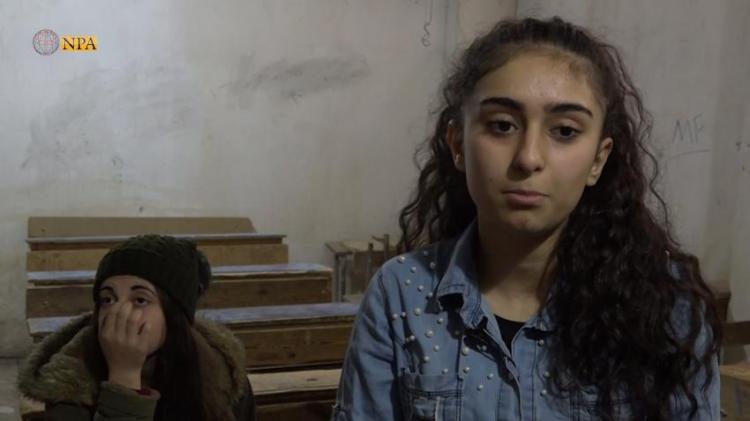The educational process in north-eastern Syria has seriously affected by the Turkish operation
Qamishli – North-Press Agency
Reem Chamoun – Sargon Yousef
On the 9th of October, hundreds of thousands of civilians were displaced to nearby cities with the beginning of the Turkish aggression against the areas of northeastern Syria, they fled far from the scene of war where a large part of them settled in schools within cities such as Qamishli, Hasakah and Tal Tamr.
One of the negative impacts of the Turkish attacks on the region was affecting the education sector, as Muhammad Salih Abdo the co-chair of the Education Authority in al-Jazira region told North-Press that about 260 schools, distributed among three areas, are out of service, which are 150 schools in Ras al-Ain, 60 schools in Zarkan/Abu Rasin area, and 50 schools in Tal Tamr, in addition to 115 schools have been converted into shelters for displaced people in Hasakah and Qamishli.
Abdo continues explaining that about 65,000 male and female students were deprived of education, and nearly 4,000 teachers stopped teaching, because the schools were being affected by the Turkish invasion, and a large part of them turned into shelters. He noted that the Education Authority is taking some measures to solve these problems, including transferring the residents of 56 schools of Hasaka to Tuweina camp, in order to ensure the return of students and teachers to schools.
Moreover, Muhammad Salih Abdo the co-chair of the Education Authority in al-Jazira region pointed out that attendance has been intensified at Hasakah schools, where some are divided into two or three shifts to make up for the shortage that students suffered during the closure of their schools and to restore educational life to normal.
Regarding displaced students, Abdo said there are plans for the Authority to return displaced students back to their study in appropriate forms.
Schools are witnessing today large numbers of students within the same class, where the number of students in some of schools reaches 70 students, as the timing of one class is insufficient for explaining some subjects due to its difficulty.
"Students have been pressured recently, as a result of the closure of schools during the Turkish bombardment, in terms of giving intensive lessons and homework, taking tests and exams in order to finish the curriculum, which in turn put a lot of pressure on the student, because in this case, he will not have enough time to study," said the math teacher Shukri Yousef to North-Press.
Yousef also stresses that when education instructors decide that teachers must adhere to the required curricula for the first semester, then teachers will not have time to finish it, and even students will not have enough time to study and digest the required lessons and subjects.
Tenth grade student Fermesk Ismail says: "When the Turkish bombing started, we escaped from the schools, where they were closed for more than 15 days, and when we returned to school, teachers intensified the lessons with no further explanation under the pretext of finishing the curriculum."
While student Yara Shaabo says: "I am forced to come to the courses at the institute because I do not understand the lessons in the school, and the teachers shorten the lessons a lot in order to finish the curriculum, which put heavy pressure on us that we do not understand the lessons and subjects required for the exams”.

